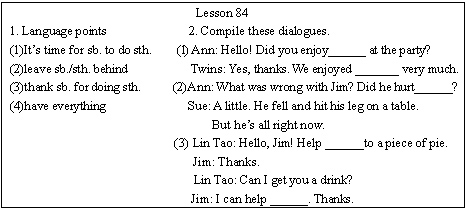 设为首页
设为首页
 加入收藏
加入收藏
Lesson 81 教学设计方案
Teaching Objectives:
Grammar: 1. reflexive pronouns
singular: myself, yourself, himself, itself
plural: ourselves, yourselves, themselves
2. past tense form of can→could
Language focus:
fall off, teach oneself, hurt oneself, learn by oneself, write down
Properties: Tape-recorder, Overhead projector
Teaching Procedures:
I. Organizing the class
1. Ask the students to get ready for class.
2. Greetings between the students and the teacher.
3. A duty report.
II. Revision
Call out 2-3 students to retell the story of the tiger and the monkey learned in the last period.
III. Leading-in
1. Tell the students they are going to talk about what they could do when they were little.
2. Ask student A:
You can ride a bike now. Could you ride a bike when you were 5 years old?
Help the students to answer “Yes, I could,” or “No, I couldn’t.”
3. Ask student B, C in the same way.
4. Point out that “could” is the past tense form of “can”.
IV. Practice
1. Pairwork: Ask the students to talk with their partners and find out what their friends could do at the age of 4. Write down their answers on the form on Page 31.
2. Report: Ask the students to report their partners abilities at the age of 4.
V. Read and act
1. Presentation
(1) Draw a picture
of Jim on the blackboard. 
(2) Say “This is Jim. Jim’s at home. His father is at work. His mother is shopping.” Repeat, then ask “Who’s at home? Jim. Is his father/mother at home? No, Jim’s alone. He’s all by himself.” Practise “(all) by himself”.
(3) Draw a picture of Betty on the
blackboard.  Talk about Betty
in the same way, using “Her father/mother” and “She’s(all)
by herself”.
Talk about Betty
in the same way, using “Her father/mother” and “She’s(all)
by herself”.
(4)Ask two students to open the door. Then ask one of them to close it: “Please close the door (all) by yourself.” Repeat with other students and other task. Introduce – “selves (ourselves, yourselves and themselves)” in the same way.
(5) Tell the students: “I am going shopping. I want to buy Li Lei some shoes. I want to buy Wei Hua a hat. I want to buy Han Meimei a dress. I want to buy myself a hat. “Ask” What do I want to buy Li Lei/ Wei Hua/Han Meimei/myself? Get the students to say You want to buy yourself some shoes/…Point out the use of “myself”. Tell the students: “You are going shopping. You want to buy your friend and yourself something.”
T: Go around the class, asking “What do you want to buy your friend/yourself? What does he/she want to buy his/her friend? What does he/she want to buy himself/herself?”
2. Students book: Page 31 Part One Speech cassette Lesson 81.
3. Look at the pictures, ask What’s Lily doing?
4. Play the tape of the dialogue for the students to listen and repeat.
5. Explain the language points.
(1) fall off从……上摔下来
①Be careful! Don’t fall off the ladder.
②–He fell off the horse and hurt himself.
–I’m sorry to hear that. I hope he’ll be well soon.
(2)hurt oneself 伤着自己
① –Did he hurt herself this time?
–No, he didn’t.
(3)teach oneself = learn by oneself 自学
–Lily taught herself swimming.
–She’s very clever.
6. Ask the students to recite the dialogue.
VI. Exercises in class
用适当的反身代词填空。
1. Help________ to some fish, Lily and Lucy.
2. Jim is old enough to look after________.
3. We all enjoyed________ in the week-long National Day holiday.
4. I hope not many people hurt ________ in the accident.
5. My mother taught_________ English at the age of 40.
6. My parents went to travel and left me by _________ at home.
Keys: 1.yourselves 2.himself 3.ourselves 4.themselves 5.herself 6.myself
VII. Homework
1. Finish exercises on page 97.
2. Make sentences with reflexive pronouns.
VIII. Summary
写出下列动词的过去式。
1.do________ 2.hurt________ 3.is________
4. can________ 5. teach________ 6. learn________
7. fall________ 8. swim________ 9. sing________
10.ski________ 11. read________ 12.write________
Keys: l. did 2.hurt 3.was 4.could 5.taught 6.learned/learnt 7.fell 8.swam 9.sang 10.skied 11.read 12.wrote
IX. Writing on blackboard
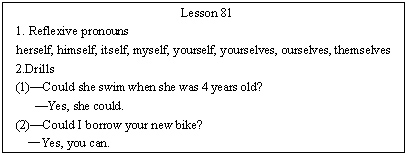
Lesson 82 教学设计方案
Teaching Objectives:Enable the students to understand the reading passage about Beethoven.
Language Focus: afford to do, for fun, knock at, to one’s surprise, write down, hear sb. do/doing, dim, blind, shine (shone, shone)
Properties: Tape-recorder, Overhead projector
Teaching Procedures:
I. Organizing the class
1. Ask the students to get ready for class.
2. Greetings between the teacher and the students.
3. A duty report.
II. Revision
T: Ask the students to say sentences with “could” and “self”.
III. Reading
1. Pre-reading:
Ask the students the following questions before reading.
(1) Do you like listening to music?
(2) What do you know about Beethoven?
(3) Can you play any musical instruments? How well can you play?
(4) The teacher gives a brief introduction of Beethoven.
2. While-reading:
(1) Ask the students to read the passage silently by themselves.
(2) Ask the students to answer the reading comprehension questions.
(3) Play the tape for the passage and ask the students to read after the tape.
(4) Explain the language points.
①sonata/s[5na:t[/: musical composition for one instrument(eg. the piano) ,or two(eg. piano and violin) , normally with three or four movements. 奏鸣曲
②afford to do: (通常与can, could, be able to连用)spare or find enough time or money for
–We can’t afford to go away this summer.
–I can help you.
They aren’t able to afford to buy a big apartment. So they have to live in a small house.
③to one’s surprise = to the surprise of sb.
To my surprise/To the surprise of everyone, his plan succeeded. I feel very happy for this.
To our surprise, he survived in the aircraft. Good luck!
3. After-reading
(1) Ask the students to retell the passage.
(2) Ask the students to talk about their feelings after reading the passage.
(3) Ask the students to work in pairs and then act it out.
IV. Exercises in class
根据句意填空。
1. The candle light in the small room wasn’t bright, it was _________.
2. Don’t take it seriously, I just said it ________ _________.
3. The girl can’t see at all. She is_________.
4. The girl listened to the woman next door play the piano and learned all by ________(part of body). She is very clever.
5. He’s too poor to _________ a big house. So he must work hard to earn much money.
Keys: l. dim 2.for fun 3.blind 4.ear 5.afford
V. Homework
1. Finish exercises on page 98.
2. Retell the passage.
3. Rewrite the passage.
VI. Summary
翻译句子。
1.我们经常听见她在楼上弹钢琴。
2.姑娘和她的哥哥沉浸在贝多芬的美妙音乐中。
3.一天晚上贝多芬正地街上散步,这时突然在一座小房子外停住了。
4.他们太穷了,以至于不能负担得起音乐会票。(too…to;afford to)
5.一个年轻人正在桌边做鞋,他的妹妹正在弹钢琴。
Keys:
1. We often hear her play the piano upstairs.
2. The girl and her brother both lost themselves in Beethoven’s beautiful music.
3. One evening Beethoven was walking in a street when he suddenly stopped outside a little house.
4. They are too poor to afford to buy tickets to the concert.
5. A young man was making shoes by a table while his sister was playing the piano.
VI. Writing on blackboard
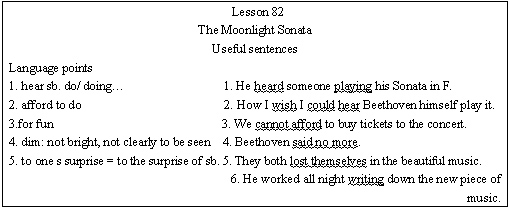
Lesson 83 多媒体教学设计方案
教学目标:
1.继续学习反身代词的用法
2.继续学习情态动词can的过去式could。
3.熟练掌握并列句的用法。
教学过程:
1.(录像演示)复习前面学的反身代词的用法,从而导入本节课继续学习反身代词。
2.(导入)教师由介绍贝多芬有才华但贫穷导入Part 1的教学,让学生先了解Mr. More和Mr. Little的情况。
3.(录像演示)让学生带着下面的问题观看Read and learn的情景演示,了解教材的大意。
Does Mr. More enjoy himself? Why?
Does Mr. Little enjoy himself? Why?
(学生活动)让学生根据录像内容回答下列问题:
w1. Could Mr. More buy himself lots of nice things?
w2. Did he have many friend?
w3. Did he enjoy himself?
w4. Why didn’t he enjoy himself?
w5. Could Mr. Little buy himself lots of nice things.
w6. Did he have many friends?
w7. Did he enjoy himself?
w8. Who was happier, Mr. More or Mr. Little? Why?
教学这部分内容的语言点:
(录像演示)复习并列句的运用。然后通过练习来巩固对并列句的运用。
将下列句子用but 或and 连接.
1.The boy is very clever. He didn’t work hard.
2. Mary is always kind to us. We all like her.
3. My brother is very careless. He never forgets his homework.
4. Jane is a worker. He loves his work very much.
(录像演示)先复习情态动词can的用法,本单元教学的是can的过去式could。
wA: Can you swim now?
wB: Yes. I can.
wA: Could you swim two years ago?
wB: No, I couldn’t. I learned it last year?
4.(学生活动)Discussion
让学生讨论:If you have lots of money, what will you do?
1) Who do you want to be, Mr. More or Mr. Little?
2) Can money bring us everything?
3) Which do you prefer, money or friendship?
5.(录像演示)Read and say,让学生观看对话,学习新词汇:come along, return,然后回答问题:
1)What are Sarah’s friends going to do tomorrow?
2)Can Sarah go with them? Why or why not?
让学生表演此对话,然后做类似的对话,运用反身代词。
6.总结
(课件演示)反身代词的运用。
7.Exercises
用适当的反身代词填空。
1. He taught ________French.
2. Did Ann and her friends enjoy _______at the party last night?
3. “Who did you go there with?” “Nobody. We went all by ______.”
4. Could Mr. More buy _______lots of nice things?
5. He said to _______, “I don’t know why!”
6. He said, “Boys and girls, help _______.”
7. “You must look after _______at home,” Jim’s mother said to him.
8. I can’t leave her by________.
Keys: 1.himself 2.themselves 3.ourselves 4.himself 5.himself 6.yourselves 7.yourself 8.herself
用连词and, but, so, or填空。
1. He helps her _________she helps him.
2. I got up late this morning, ________I wasn’t late for school.
3. You may go to Hangzhou ________go to Guilin.
4. He is ill, ________he can’t come to school.
Keys: 1.and 2.but 3.or 4.so
8.Homework:
1. Copy the words and the phrases.
2. Do the exercises on page 99.
3. Writing: Can Money Bring us Everything(150 words) .
Lesson 83 教学设计方案
教学目标:
1.掌握重点单词和词组:enjoy oneself, go on a trip, buy oneself something
2.熟练掌握并列句的用法,能正确区分和使用连词and和but。
3.能读懂课文的短文并能回答问题。
教具:教学磁带,图片和卡片。
教学过程:
Step 1 Revision.
Revise the reflexive pronouns.
教师出示图片或学生自带些照片,让学生根据图片互相提问:(如教科书中的图)
What’s the matter with the boy? Did he hurt himself?


What were the children doing? Did they enjoy themselves?
Step2 Leading- in
1. Ask one student: “If you have lots of money, what will you do?”
2. Ask the students to discuss the problem in groups.
3. Ask the students to present their opinions.
Step3 Presentation.
T: Last time, we have known Beethoven. As we know, Beethoven was very great but he is poor. Today we’re going to learn two persons, one is rich and the other is poor. Now, look at the pictures please.
1.让学生带着下面两个问题听读课文,了解课文大意。
Does Mr. More enjoy himself? Why?
Does Mr. Little enjoy himself? Why?
2.学生阅读课文,并回答教科书33页的问题。然后两人一组做问答练习。
3.学生根据图画和关键词对课文进行复述。
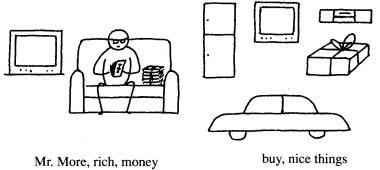
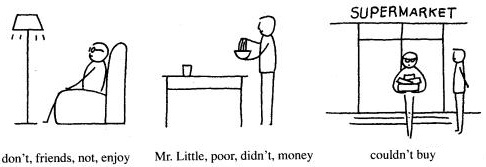
More, rich, had lots of money, doesn’t have many friends, doesn’t enjoy himself.
Little, poor, didn’t have much money, has many friends, enjoys himself.
4.让学生将下列句子用but 或and 连接.
A: The boy is very clever. He didn’t work hard.
B: Mary is always kind to us. We all like her.
C: My brother is very careless. He never forgets his homework.
D: Jane is a worker .He loves his work very much.
5.Discuss the question:
If you have a lot of money, what will you do?
1) Who do you want to be, Mr. More or Mr. Little?
2) Can money bring us everything?
3) Which do you prefer, money or friendship?
Step 4 Read and say.
1. Play the tape for the students to listen and find out the answers to the following questions.
1)What are Sarah’s friends going to do tomorrow?
2)Can Sarah go with them? Why or why not?
2. Play the tape again and ask the students to listen and try to retell.
3. Call 2 ~ 3 students to retell the dialogue.
4. Practice the dialogue in pairs.
5. Ask the students to make a similar dialogue.
Step 5 Exercises
画出下列句子中的错误并改正。
1. Sarah’s parents will be very worry if she takes her brother out.
2. Sarah said to her friends, “ Enjoy yourself.” They all have a good time.
3. —Would you like to come along?
—Yes, I’d love.
4. Mr. Little had many money. But he has no good friends.
5. Sarah’s little brother is so young to look after himself. So her mother has to stay at home.
Keys: 1.worry→worried 2.yourself→yourselves 3.lover→love to 4.many→much/a lot of/lots of 5.so→too
选择适当动词并用过去式填空。
|
have do can be |
Mr. More________ very rich .He________ a lot of money .He________ buy himself lots of good things, but he ________ not know why he ________ not enjoy himself.
Keys: was, had, could, did, did
Step 6 Homework:
1. Copy the words and the phrases.
2. Do the exercises on page 99.
3. Writing: Can Money Bring us Everything(150 words) .
板书设计
|
1. Comparing the two persons. (1) (2) (3) 2. Drills (1) Would you like to come along? I’d love to. (2) My little brother is too young to look after himself. (3)I can’t go out until my mother returns. (4) Have a nice weekend with your brother!
|
Lesson 84 教学设计示例
Teaching Objectives:
Develop the students’ four skills of listening, speaking, reading and writing;
Revise the whole unit.
Language Focus: leave. . . behind, It’s getting late. , It’s time for sb. to do sth., thank you for doing sth.
Properties: Tape- recorder
Teaching Procedures:
I. Revision
1. Ask 2 ~3 students to give a speech ‘Can Money Bring us Everything?
2. Dictate the language points of the whole unit.
II. Reading practice
1. Play the tape and ask the students to repeat the dialogue.
2. Listen to the tape and read after it.
3. Explain the language points.
1) leave sb./sth. behind: neglect or forget to bring or take.
Don’t leave me behind! It is very dark. I feel afraid.
The luggage has been left behind.
2) thank sb. for doing sth.
Thank you very much for help us. It’s very kind of you.
Thank you very much for sending us such a beautiful gift. We all enjoy it.
4. Ask the students to make a similar dialogue.
III. Listening practice
1. Pre-listening;
1) Ask the students to get ready for listening and tell them what they’ll hear.
2) Ask the students some situational questions related to the listening material.
2. While-listening:
Ask the students to bear the listening comprehension questions in mind.
3. After-listening;
Check listening comprehension questions.
IV. Grammar practice
1. Reflexive pronouns practice.
1)Ask the students to finish Exercise Two on Page 34.
2) Check the answers with the students.
3) Ask the students to read the dialogues.
2. The compound sentence practice.
1) Ask the students to finish the exercises on Page 35, making as many sentences as possible.
2) Ask the students to summarize the features of the compound sentences by themselves.
3) The teacher tells the students what the compound sentences are.
V. Writing
1. Ask the students to rewrite the scrambled thank-you note.
2. Check with the students.
VI. Revise the whole unit
1. Go over the checkpoint with the students.
2. Go over the words and expressions with the students.
VII. Exercises in class
改错练习(划出一处错误并改正。)
1. Don’t do faces while the teacher is teaching.
2. They often speak their son stories.
3. Will you please open the radio?
4. I want to thank you for invite us.
5. It’s time for go, hurry up!
Keys: 1. do→make 2. speak→tell 3. open→turn on 4. invite→inviting 5. for→to
VIII Homework
1. Finish exercises on page 100.
2. Revise the whole unit.
IX. Summary
根据上下文逻辑关系,排列对话顺序:
1. A. I’d love to. Where shall we meet?
B. All right. See you later.
C. At the station.
D. Will you go to the cinema with me tonight?
E. See you later.
Keys:
|
D |
A |
C |
B |
E |
2. A.Would you like something to drink?
B. I’d like some tea.
C. Well, a cup of tea and some cakes, OK?
D. All right.
E. No, I’d like something to eat? What about you?
Writing on blackboard
